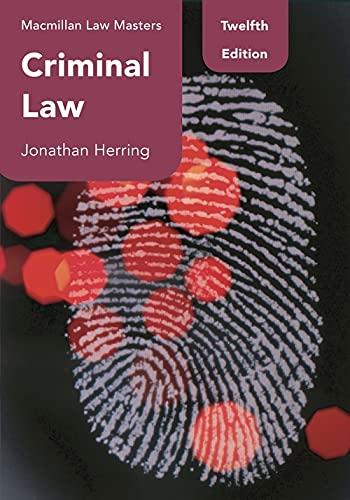Question
Module 14 In June, a police officer received information from a confidential, reliable informant. He had observed a film depicting a 16-year-old girl engaging in
Module 14
- In June, a police officer received information from a confidential, reliable informant. He had observed a film depicting a 16-year-old girl engaging in sex with a rottweiler dog while at the home of Robert Bonynge. The officer applied for a search warrant for Bonynge's residence. The affidavit accompanying the application reiterated the information received from the informant and stated that the officer sought the search warrant "to seize any film involving child pornography and bestiality". The warrant permitted the seizure of the following:
Pornography films involving female juveniles in a rottweiler dog any contraband that would violate the state statute governing the pornography laws period any filming equipment and duplicating equipment.
The affidavit is attached to the warrant. The police executed the search warrant at Bonynge's residence. A police Lieutenant observed the rottweiler dog on the premises in numerous videocassettes, 8-millimeter movies, photographs, in magazines depicting sexual scenes involving young females, possibly juveniles. The officer sees hundreds of films and photographs including several commercial videotapes of popular motion pictures. The officer stated that it was his experience that "obscene material is planted in the middle of what appears to be a commercial tape to make it difficult to locate."
- Were the videotapes seized in violation of Bonynge's Fourth Amendment rights?
- Yes, because the Fourth Amendment gives individuals the right to be free from unreasonable search and seizure and declares that warrants shall particularly describe the place to be searched and the person or things to be seized, and not all the videotapes were of pornographic subjects.
- Yes, because a warrant limits the discretion of the executing officers as well as gives notice to the party searched, and the materials seized were not described with sufficient particularity.
- No, because a warrant to search a residence gives rights to search all parts of that residence and seize any evidence found.
- Yes, because pornography is an ethical issue that must be left to individual discretion law or police action is appropriate.
- No, because the officers who swore out the affidavit also executed the search; they had the benefit of the more specific language of the affidavit.
- Which of the following would be unethical?
- The temporary seizure of constitutionally protected material (in this case, of every film and videotape regardless of content).
- Providing a prior adversary hearing before authorizing the seizure of allegedly obscene material for the purpose of destroying it.
- Accepting gratuities from bookstores or commercial theaters involved in the distribution or exhibition of pornographic materials and being loyal to fellow officers who accept gratuities.
- Varying the times when you take breaks, eating meals at different times and places, filling out reports at irregular times and places to protect yourself from temptation, and blowing the whistle on colleagues who routinely bend rules.
- Exercising discretion while extending due process to criminal suspects and victims alike (such as withholding the identity of the 16-year-old girl).
Step by Step Solution
There are 3 Steps involved in it
Step: 1

Get Instant Access to Expert-Tailored Solutions
See step-by-step solutions with expert insights and AI powered tools for academic success
Step: 2

Step: 3

Ace Your Homework with AI
Get the answers you need in no time with our AI-driven, step-by-step assistance
Get Started


